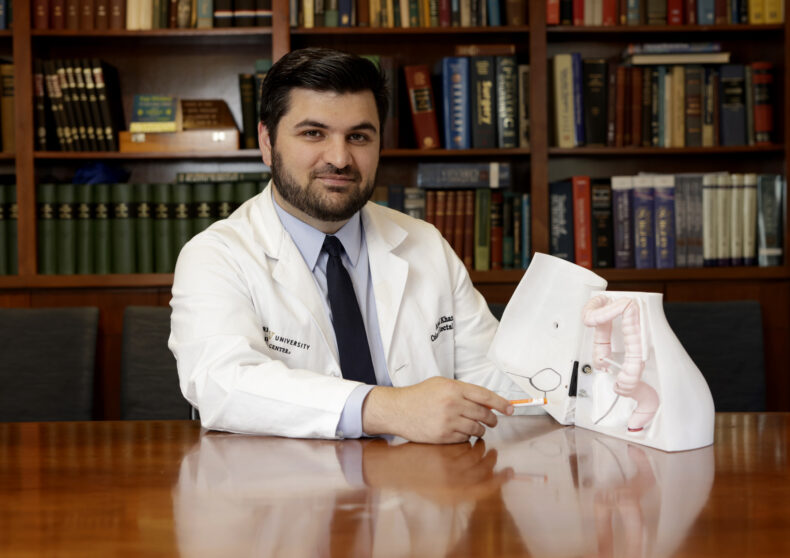Aimal Khan, MD, assistant professor of Surgery at Vanderbilt University Medical Center, noticed the puzzled or anxious expressions of patients trying to fully comprehend what he was saying during preoperative consultations, so he devised visual aids — three-dimensional models of the lower digestive tract.
The 3D models allowed patients to easily distinguish the ascending colon from the sigmoid colon, along with other parts of the digestive system. Patients could actually see where the surgery would occur, and Khan noticed that they asked more questions, felt more confident and seemed less anxious. He devised a study to determine whether his personal observations were scientifically valid.
The study, which was published June 3 in JAMA Network Open, determined that the 3D models made patients feel they played a bigger role in decision-making and that their anxiety levels decreased.
The patients were scheduled for partial or complete colon and/or rectal resections for colorectal cancer, diverticulitis or inflammatory disease. Fifty-one patients participated in the study with 28 receiving consultations using the 3D models and 23 receiving conventional consultations. The patients in the 3D arm of the study reported a significantly higher involvement in shared decision-making and significantly reduced anxiety levels compared to the other patients.
Khan and five other Vanderbilt surgeons conducted the study from March 2022 to June 2023.
“Using 3D models during consultations allowed our patients to truly visualize their surgery, which not only empowered them to take an active role in decision-making but also significantly eased their anxiety. This approach has the potential to transform how we communicate complex information to our patients. We are currently working with surgeons from other specialties, including thoracic surgery, ENT and surgical oncology, to validate these findings in a multicenter randomized trial,” Khan said.
The findings are important because other studies have shown that improvements in shared decision-making are associated with reduced hospital stays, lower health care utilization, improvement in patient-reported health outcomes and fewer emergency department visits.
The 3D models used in the study were developed in collaboration with the Department of Radiology. The modular designs, which were made with 3D printing, allowed each segment of the colon and rectum to be magnetically detached and reattached.
To the knowledge of the study’s authors, this is the first randomized clinical trial to compare the effectiveness of a 3D-printed model with usual care on colorectal surgery patients’ involvement in decision-making, anxiety and education.
Other Vanderbilt researchers who authored the study are Danish Ali, MD, Shannon McChesney, MD, Michael Hopkins, MD, Molly Ford, MD, Roberta Muldoon, MD, Timothy Geiger, MD, MMHC, Alexander Hawkins, MD, MPH, Georgina Sellyn, MA, Hillary Samaras, RN, and Dann Martin, MD, MS.
The post Presurgery consults with patients using 3D models improve shared decision-making and reduce anxiety appeared first on VUMC News.



